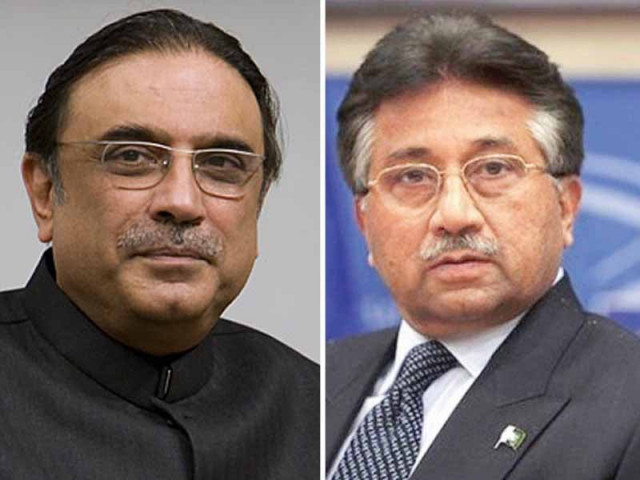Top court issues notices to Musharraf, Zardari in NRO case
SC gives one-month period for respondents to submit reply

Former presidents General (retd) Musharraf and Asif Ali Zardari. PHOTO: EXPRESS
Hearing a petition filed by Nawazish Pirzada of the Pakistan Peoples Party (PPP) against a verdict by the Lahore High Court (LHC) whereby Dar was allowed to submit his nomination papers for Senate elections, a three-judge bench of the top court, headed by Chief Justice Mian Saqib Nisar, wondered whether the PM was aware of the consequences of the citizen arrest law.
The bench also offered Dar a protective bail and ordered him to appear before the court on May 8. The court then warned that if he still remained absent, an arrest warrant could be issued.
During the hearing, only Dar’s counsel, Salman Aslam Butt, was present in court. Upon the bench enquiring of the former federal minister’s absence, Butt replied that Dar was ill and currently in another country.
“He can’t be ill enough not to show up when summoned,” the court remarked while rejecting a medical certificate submitted by Butt on Dar’s behalf.
In March, the apex court had issued a notice to Dar over a plea against the LHC verdict that allowed his nomination papers for the Senate elections.
Top judge rejects talk of NRO-style deal
NRO
The same bench also issued notices to former presidents General (retd) Pervez Musharraf and Asif Ali Zardari, former attorney general Malik Mohammad Qayyum and the National Accountability Bureau (NAB) over a petition filed against the National Reconciliation Ordinance (NRO).
The petition was filed by Feroze Shah Gillani wherein he submitted that the country had suffered a loss of billions of rupees due to the ordinance and requested the court to take action to recover the stolen amount.
Subsequently, the top court gave a one month time to the respondents to submit reply and adjourned the hearing for a month.
The NRO is a controversial ordinance which was issued by Musharraf granting amnesty to politicians in cases registered between January 1, 1986, and October 12, 1999. However, the ordinance was declared unconstitutional by the top court on December 16, 2009.
Recruitment ban
Moreover, the top court referred to the Islamabad High Court (IHC) a decision by the Election Commission of Pakistan (ECP) to ban development schemes and new recruitment to government departments.
The court urged the IHC to form a division bench, headed by Justice Amir Farooq, and take a decision on the matter in a week’s time.
A plea by the Punjab government against the ECP notification will also be transferred to the IHC and all provinces can contest against the decision there.
“The case will be heard on a daily basis, however, the ban remains in effect till the IHC order,” said the bench’s order.



















COMMENTS
Comments are moderated and generally will be posted if they are on-topic and not abusive.
For more information, please see our Comments FAQ